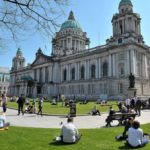By Richard Ammon
GlobalGayz.com
June 2010
Freedom Sudan
Gay life in Sudan is virtually non-existant from an observer’s eye. Deeply Muslim (in the north) and very conservative, the laws against same-sex behavior are severe. Nevertheless, a gay-focused website was launched in December 2006 called Freedom Sudan-the Sudanese LGBT Association.
On their website it says:
“Freedom Sudan is the lesbian, gay, bisexual, and transgender (LGBT) organization in Sudan. Our status is illegal. Homosexual behavior is illegal in Sudan and homosexuals facing the death penalty. That’s why our organization was formed in secret and all our activities are carried out secretly, hoping that one day we will get accepted in our communities and even in our families, and hope that we can be Free to be the way we are. Freedom Sudan is an organization run by volunteers only.
“Our main goals are:
* Recognition of homosexuality in Sudan.
* Social acceptance of homosexuality and acceptance of the rights of gays in Sudan.
* Abrogation of the death penalty for homosexuals (Articles 148,151, 316 and 318).
* Work together with other LGBT organizations in the world for a better LGBT rights.”
The organization also has its own Twitter account here. There haven’t been any reactions to this news yet within the Sudanese blogosphere.
LGBT Rights in Sudan (from: http://en.wikipedia.org/wiki/LGBT_rights_in_Sudan)
Homosexual behaviour is illegal in Sudan. The judicial system is based on the Shari’a and according to Article 148, capital punishment applies should the offense be committed either by a man or a woman. One hundred lashes are given to unmarried women who engage in homosexual acts. For lesbian women, stoning and thousands of lashes are the penalty for the first offence. men, lashes are given for the first offence, with the death penalty following the third offence.
Some History
Siegfried Frederick Nadel, writing in the 1940s and 50s noted that among the Otoro, a special transvestitic role existed whereby men dressed and lived as women. Trasvestitic homosexuality also existed amongst the Moru, Nyima and Tira people, and reported marriages of Korongo londo and Mesakin tubele for the bride-price of one goat.
In these tribes with “widespread homosexuality and tranvesticism”, Nadel reported a fear of heterosexual intercourse as sapping virility and a common reluctance to abandon the pleasure of all-male camp life for the fetters of permanent settlement. “I have even met men of forty and fifty who spent most of their nights with the young folk in the cattle camps rather that at home in the village.” In these pervasively homoerotic societies, the men who were wives were left at home with the women.
Among the Mossi, pages chosen from among the most beautiful boys aged seven to fifteen were dressed and had the other attributes of women in relation to chiefs, for whom sexual intercourse was denied on Fridays. After the boy reaches maturity he was given a wife by the chief. The first child born to such couples belonged to the chief[2].
Today, the issue has divided some religious communities. In 2006, Abraham Mayom Athiaan, a bishop in South Sudan, led a split from the Episcopal Church of Sudan for what he regarded as a failure by the church leadership to condemn homosexuality sufficiently strongly.
Report: Rape of Slave Boys in Sudan
(from: http://findarticles.com/p/articles/mi_m2242/is_1661_284/ai_n6140462/)
“After taking care of his master’s cattle all day, Majok said he was often raped at night. He told me that his rapes were very painful and he would rarely get a full night’s sleep. He also spoke about the other slave boys he saw who suffered the same fate. ‘I saw with my eyes other boys get raped’, Majok said. ‘He [the master] went to collect the other boys and took them to that special place. I saw them get raped’…” Read the full story.
Podcast: Homosexuality in Sudan – A conversation with a gay blogger
February 2010
By Eeem Shawkat (Sudan)
This is the first podcast in a long series on homosexuality in Sudan. Mideast Youth talks to Ali, a single gay Sudanese man living and working in the Gulf. When Ali started his blog, black-gay-Arab, he was only trying to find himself. Three years later, Ali has a lot of followers and writes about his identity as a gay man, posts videos and songs featuring interviews with mothers finding about that their sons are gay and shares the struggle of LGBT people in many Arab countries.
In this podcast, we discuss his identity, his struggles and the situation of LGBT people in the Arab world. In his blog, Ali shares some of his views on the subject of coming-out of the closet or revealing to people your sexuality.















